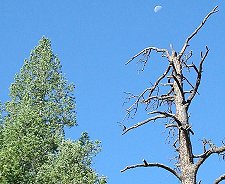The Slow Death of Nature
 My two sons would just as soon spend 3 or 4 hours playing computer games than interact with real people. But, who can blame them? With the amazing graphics, sound, and practically real interaction, games these days are nearly "like being there". One son just got a unicycle for Christmas and has put in many hours and can now ride it. But, he just found an online unicycle game and there he can hop, jump, ride rails, fly, and more waaaaay cool stuff that he'd never be able to do in real life. Fantasy at your fingertips, I guess.
My two sons would just as soon spend 3 or 4 hours playing computer games than interact with real people. But, who can blame them? With the amazing graphics, sound, and practically real interaction, games these days are nearly "like being there". One son just got a unicycle for Christmas and has put in many hours and can now ride it. But, he just found an online unicycle game and there he can hop, jump, ride rails, fly, and more waaaaay cool stuff that he'd never be able to do in real life. Fantasy at your fingertips, I guess.It's pretty hard for hiking and camping to compete with flying, explosions, racecar driving, and the like. Actually getting out into the world takes effort, has limitations, and isn't always fun. Why bother when I can click a button and be flying a plane or parachuting behind enemy lines or battling orcs and goblins?
For all the concern scout leaders have about sports and other organizations taking boys from scouting, we are completely missing the boat. A boy involved in any other activity is positive, but we are losing boys to sedentary fantasy without social interaction. This, I believe, will result in the slow death of nature.
A very interesting study complete in 2006 (http://www.videophilia.org/uploads/JEM.pdf) takes a look at the 50 year increase in national park attendance followed by 16 years of decrease through 2003. The decrease began in 1988, right when Internet use, video games, home theatres all began to gain popularity. Time spent on these sedentary activities increased 327 hours/year for the average American from 1987 to 2003 � that's about 2 full weeks. I would suggest that for scout-age boys, the increase is vastly greater. This electronic entertainment propagation is reducing the amount of time we spend actually living life.
We are spending far less time in the outdoors and the trend is continuing down. Environmental awareness, conservation, and responsible stewardship can't help but drop as we spend less time interacting with and experiencing the wilds. As all our cravings for excitement and challenge are fulfilled electronically, we care less for the real world. It doesn't really matter if there are green spaces, wilderness areas, birds, or beasts if we have no perceived need for them.
Videophilia is the new human tendancy to focus on sedentary activities involving electronic media. This is in contrast to Biophilia, people's appreciation of nature, and is already having a huge negative impact on our population. It has been tied to the national surge in obesity, poor exercise habits, lower social awareness, and lessened interpersonal skills. As these trends continue and our concern for the people and world around us decrease, support for, use of, and caring about our natural environment will fall by the wayside.
 Looking at the overall problem through the eyes of one person, it may appear hopeless. After all, the Internet is here to stay, video games keep getting better, and electronic entertainment just keeps getting more and more real. That can't be changed, and it may be a losing battle, but I can at least do something where I am. Here's a few ideas:
Looking at the overall problem through the eyes of one person, it may appear hopeless. After all, the Internet is here to stay, video games keep getting better, and electronic entertainment just keeps getting more and more real. That can't be changed, and it may be a losing battle, but I can at least do something where I am. Here's a few ideas:- Ensure the troop has at least one campout every month
- Push for one more hike or outdoor activity every month
- Hold troop meetings outdoors
- Find outdoor rather than indoor service projects
- Guide Eagle Scouts towards outdoor projects
- Challenge scouts to earn the National Camping award
- Promote environmental merit badges and awards, such as Leave No Trace, Hornaday, World Conservation, Paul Bunyan
- Go for a walk every day, even if it's just 10 or 15 minutes
Maybe we should list Outdoors first of the eight methods of scouting for the next few years since it always seems to be around 3 or 4 when they are listed. This is the main reason I started my sons in scouting. It wasn't for the citizenship or character development � it was to make sure they had a reason to spend time in the outdoors, learning to care for themselves, nature, and others. The citizenship and character come from that experience.
Scout On
Posted: 9:33 03-28-2009 407
Comment or Question about this page:
Scouting 2025 - Ask a Question - Add Content
Just for Fun: Socializing merit badge




This site is not officially associated with Scouting America
Find more Scouting Resources at www.BoyScoutTrail.com



Follow Me, Scouts
Recent Comments